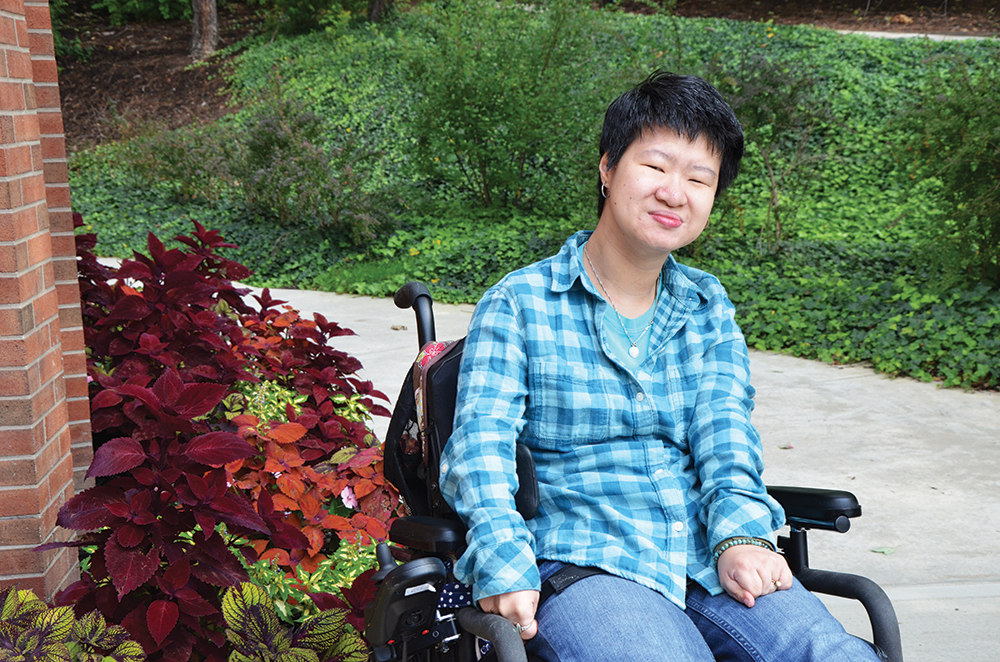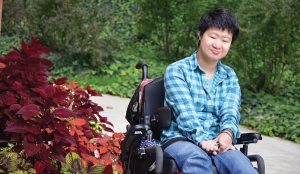By Marissa Carney

Loud and Clear
Through her writing, Erin Kelly shares her passion and her purpose.
After a crude birth on the streets of Seoul, South Korea, in 1985, Erin Kelly was left at a local police station with only a note that read, “Please adopt her to a Family that can raise her.”
Indeed, there was a family that wanted the baby girl, a family that could love her despite the obstacles sure to be in her way. Tim and Debbie Kelly, of Altoona, adopted Erin when she was 11 months old, fully prepared to care for a child who was born with cerebral palsy.
Cerebral palsy is a disorder of movement, muscle tone, or posture caused by damage to the developing brain, most often before birth. Kelly’s condition may have been due to a lack of prenatal care or a host of other factors. “It sometimes gets under my skin not knowing why I have cerebral palsy,” Kelly admits. “I’ve learned to accept the fact that I have something that will never go away. I think that’s always been my biggest challenge, even though every day is a challenge in itself.”
Affections are different for each person with the disability. Kelly is confined to a wheelchair and can speak minimally. “My life admittedly gets mentally exhausting at times, particularly when I’m trying to do something simple like get into a car. I’m immediately hit with a heavy dose of reality, because for me, very few things are as simple as they look.”
And yet, Kelly is driven and determined. She’s articulate and talented and is well on her way to achieving her goals.
Writing has always been of significant importance to Kelly. “I started writing when I was a kid, mainly as a personal reaction to my circumstances and because I felt that I wasn’t being seen or heard in the ways I wanted to be. I relied on my creativity to express myself. I had piles of coloring books and crayons, and I wrote on whatever surface I could find.” But as she grew older, something deeper clicked for Kelly. “I realized I was writing for a purpose. It wasn’t just a matter of saying, ‘oh, I like to write!’ It was more of a revelation that I had a way to bring things deep in my soul out to the surface. These things suddenly had a chance of being heard in a way that my cerebral palsy didn’t fully allow at the time.”
Kelly started out using a communication board that had approximately 200 keys on it. Each key had three or four different meanings and functions. Throughout high school, she used a laptop programmed specifically for her, and from there, she purchased a regular laptop to use for college.
Kelly chose to attend Penn State Altoona because she wanted to expand on her knowledge of writing, and the campus offered firsthand experience in the form of top-notch courses and professors who had established themselves in the literary world. She majored in creative writing and communications under the Letters, Arts, and Sciences program, which allowed her to design her major based on her interests and aspirations. “Writing is how I deal with a lot of the emotions that come with my disability. At Penn State Altoona, I had many opportunities to explore and expand on that. The four years I spent at Penn State Altoona definitely prepared me to build my career as a writer, journalist, and soon-to-be published author. That was my ultimate goal—to not only be a good writer, but a successful one, too.”
Kelly took as many English and writing-based classes as she could each semester, most of which were taught by Erin Murphy, Steve Sherrill, and Patricia Jabbeh-Wesley. She learned new techniques and skills in each class and reveled in the constant encouragement that her professors gave her. “I was fortunate to have Erin in my poetry and creative nonfiction writing classes,” says Murphy. “Two words come to mind when I think of her: talented and tenacious. She has a fiercely creative mind, which can be seen in her poems and essays. Her tenacity is evidenced by the fact that she completed her bachelor’s degree despite many obstacles. When one door closes, Erin pushes open another one. Writers at all stages of their careers could learn a great deal from witnessing her determination and work ethic.”
Kelly worked as a staff member for the campus newspaper for most of her college career. Her director also worked at the Altoona Mirror during that time and helped Kelly secure a position there as a columnist during her senior year. “It ended up being my first ‘big break’ as a writer,” Kelly says. “It was around that time that I realized I shouldn’t limit myself to one genre of writing, like many of my professors had advised me not to do. They felt I had potential writing in multiple genres, and I was beginning to believe that, too.”
It has now been eight years that Kelly has written the monthly column, “The View From Here,” for the Mirror’s Life section. Her main goal with the column has always been to teach people how to feel comfortable communicating with challenged individuals. She is proud to say her words have impacted many. “I no longer stand beside my parents as someone tells them they enjoy my column. They now speak directly with me, and for that I am grateful.”
 Also during her senior year, Kelly created a capstone project in which Sherrill compiled some original poems she’d written and had them printed as a smaller book, which coincided with a play she directed. “It was rewarding to see something like that come to life, because in many ways, it served as one of the first building blocks of my career.”
Also during her senior year, Kelly created a capstone project in which Sherrill compiled some original poems she’d written and had them printed as a smaller book, which coincided with a play she directed. “It was rewarding to see something like that come to life, because in many ways, it served as one of the first building blocks of my career.”
Kelly graduated in 2009 and has since been gaining ground with her writing. She has written for numerous online publications including The Huffington Post, Upworthy, The Mighty, and The Good Men Project, where she was offered a writing position in 2012, and then served as social justice editor from 2014-16. Kelly says The Good Men Project was her first introduction to writing specifically for online media, but it also led to other projects, one of which was with a now-retired professor from Penn State Altoona. Kelly was the editor for the Ilse-Rose Warg’s book, To Cope and To Prevail.
In January 2014, Kelly secured her current position at The Huffington Post, where she covers disability issues on a national and global scale. “The majority of my work now is usually disability-based for publications that are not focused on disability. The fact that these publications, as well as their audiences, are willing to even look at my work is humbling, to say the very least.”
In addition to her online work, Kelly has also written numerous book reviews of pieces by established, published authors. Kelly believes she must be doing something right or she wouldn’t be earning these opportunities. She is also pleased that her hard work and dedication are allowing others to see beyond her exterior. “I’m proud to know I’m being hired based on my abilities as a writer rather than my disability. More people are now seeing that there’s more to me than my cerebral palsy.”
Kelly’s most recent accomplishment is a contract signing with Finishing Line Press to release her first book, How To Wait—a book that grew out of that senior capstone project she did way back in 2009. The release is scheduled for May 2018. “The collection of original poetry is inspired by the things I think, feel, and see from the vantage point of my wheelchair, and what it means for me to be patient in times when that’s difficult to do.”
Kelly says the road to publication was a long one, lined with roadblocks of rejection. Achieving a book deal has energized and excited her for what could be next. “I learned at a very young age that I was going to have to work harder than most to get what I want out of life. I’ve always had to prove myself, not only because my chosen profession is extremely tight and competitive, but also because of my cerebral palsy. In turn, I’ve also learned that no one is just going to hand me what I want, nor do I expect them to. I’ve worked for absolutely everything I have in my life. I am willing to put in the time and effort to continue my success.”
Kelly has always thought that if she was going to become a writer, she would pour her heart and soul into it. She would learn as much possible about the craft of writing, but always do what felt right for her—to follow her heart. As she does, the message behind her work remains simple. “I want people to know that disability in general isn’t something that should be feared. I not only want others to feel comfortable talking and interacting with me, but I also want them to know it’s okay to talk about disabilities and ask questions. This is my life and these are the cards I’ve been dealt. If anything, I want people to know I exist. I’ve been given a precious gift in the form of writing, so I’ve made it my personal responsibility to use it wisely, in a way that potentially helps others. Ultimately, I want to be known for my abilities, not just my disability.”
